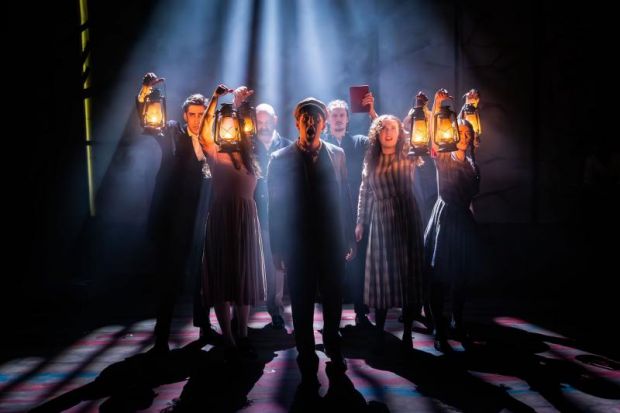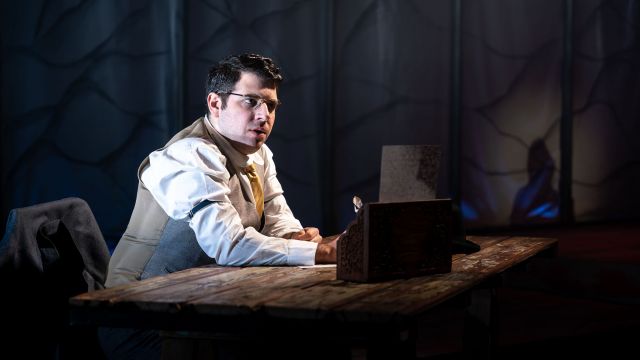Parade
Parade, a multi-award-winning music theatre piece from 1998, begins in Marietta, Georgia at the time of the American Civil War. A young Confederate soldier goes off to fight and die so that a tiny proportion of the southern states’ population can keep their plantations and their slaves. Scene two, it’s 1913 and the Confederacy may have lost the war twenty-eight years ago, but in the face of overwhelming evidence, the folks in Atlanta refuse to believe it. Sound familiar? They’re about to celebrate with a Confederate Memorial Day Parade…

Denial of reality is not all that makes Parade reverberate into our present. It’s based on the true story of the 1913 false conviction of Jewish factory manager Leo Frank for murder, and his lynching in 1915. So here we have mob violence, hypocrisy, blind ambition, fake news and antisemitism. That Unite the Right demonstration in Charlottesville, Virginia, could happen in Parade.

It's a sombre and timely piece but presented here with enormous verve, a universally talented cast, a touching love story, skilled direction and choreography, a great musical score and songs - every one of which reveals character and advances the plot. Imagine that! Composer and lyricist Jason Robert Brown moves seamlessly between sentimental melodies of the Old South, turn of the century dance, jazz, honkey-tonk and non-jarring pop.

The ensemble, many doubling up, are cohesive and disciplined, distinguishing clearly between their characters. James Nation-Ingle plays ambitious State Attorney Dorsey as hail-fellow-well-met blandly evil, knowing he needs a big conviction to advance his ambitions. (‘Ain’t gonna be enough to hang a nigra this time.’) Itunu Akin Ojelabi as housekeeper/maid Minola plays it necessarily dumb – but with her fellow black servants she asks if what’s going on in their town would be so noticed ‘up north’ if the accused were black. Nic Davey-Greene as Governor Slaton is delightfully elegant and fun-loving but Davey-Greene makes it credible that he can be shamed into acting ethically. Samuel Skuthorp gives us the steps that make unscrupulous reporter Britt Craig’s transition to humbled guilt when he confronts Lucille Frank’s grief. As for Lucille (Montana Sharp) and Leo Frank (Aaron Robuck), theirs is the personal drama at the centre of this story.

Leo, the educated Brooklyn Jew, totally out of place in Georgia, workaholic, is brusque, rude, and unfeeling until he realises, almost too late, how much his wife loves him and supports him. Aaron Robuck’s performance is pitch perfect and his singing (he is also a cantor) goes straight to the heart. And Montana Sharp, with her beautiful voice, brings a moving dignity, courage and stoicism to Lucille.

Director Mark Taylor maintains the energy and the pace but without unnecessary haste, makes the transitions between the many scenes smooth, and elicits powerful and effective performances that have just enough touches of detail to make functional characters credible. He and choreographer Freya List have collaborated on movement throughout – even with a big cast it’s not easy to create a trolley ride, street scenes and street parades, dances – elegant and more down home – protest marches and a lynch mob. A dance at the governor’s mansion is particularly fine – juxtaposed ironically with Leo languishing in jail – and still visible there on stage. Here, it’s often movement and music that tell us just where we are in the story. (The practised ease with which this is done recalls the collaboration of director and choreographer in the beautiful transitions of Come from Away.)

If there are flaws here, we could mention the sound balance; the songs are often drowned by the over-enthusiastic band, and one might have thought that could or should have been addressed across the run. Harry Gill’s set design (perhaps constrained by budget) is more than serviceable for the many locations, but the intentions behind the backdrop and network of timber (branches?) could be clearer.

In applauding and endorsing this show, one must also do the same for producer and musical director Benjamin Samuel and Soundworks Productions. Their ambition and nerve in bringing together and mounting such an impressive production of this challenging show is a lot more than merely admirable. In these times, a thoroughly professional show with an all-talented cast of seventeen, period costumes with numerous changes, and a ten-piece band is no mean feat. Soundworks has equally ambitious plans for future shows (e.g. Songs for a New World) and are so worthy of our support.
Michael Brindley
Photographer: Matthew Chen
Subscribe to our E-Newsletter, buy our latest print edition or find a Performing Arts book at Book Nook.

